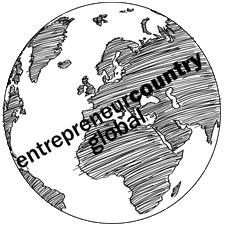The Growth and Rebirth of Entrepreneurship in the Arab World
Talking with Entrepreneurship students about strategy is like talking to millennials about pension plans. Thanks, but no thanks. It doesn’t help that textbooks on strategy are on the whole quite dull affairs (few, if any, people on their death bed request a copy of Robert E. Grant´s Contemporary Strategy Analysis).
 The trick therefore is to talk about strategy by telling fast paced stories of people and places, without actually using the very unurgent “S word” itself.
The trick therefore is to talk about strategy by telling fast paced stories of people and places, without actually using the very unurgent “S word” itself.
Texts by Sun Tzu, Machiavelli, Robert Greene, von Clausewitz are all on hand if I needed them but I always tend to lead with Twenty Seven Articles, a sort of “For Dummies” document written in 1917 by T.E. Lawrence as a guide for British officers to work effectively with Arab Bedouin. Those cynics among you will immediately tut tut about how peaceful the Middle East has been ever since but it is the approach he took that is worth studying. Among the 92 nationalities in the MBA programme at IE Business School, Lawrence´s words always provoke what Mrs. Merton called a “lively debate” as to whether they are still relevant today. Those who still live in the MENA (Middle East & North Africa) region like to dismiss it but the immigrant children of Lebanese or Syrian parents, especially those who grew up in Columbia or Mexico, tend to argue that it is as accurate today as ever.
I mention the Lebanon in particular as if you have not come across the Lebanese diaspora, it is because you just don’t know it. The best known is Mexican magnate Carlos Slim, who appears in some lists as the richest man in the world, but other names include Carlos Ghosn of Renault Nissan and Nicolas Hayek co-founder of Swatch. When the Israeli influence on Silicon Valley is highlighted, some Arabs like to counter that Steve Jobs´s biological father was a Syrian and companies such as Cloudera, AdMob, Paypal, Google and Yahoo have all had people of Arab origin in senior executive roles. So while the Gulf region is currently dominated by income from hydrocarbons, there are role models which could be used to inspire innovation and entrepreneurship in parallel.
Arab Spring
While most of the attention has been either on the fall of regimes in Tunisia, Libya and Egypt or the wars in Iraq and Syria, change has also come to countries such as Jordan, Kuwait and Morocco. Here the rulers know that some amount of reform is necessary to placate a populous better informed than ever as a result of social media and mobile telephony. And so as we have seen in many EU countries and even just before the recent US Presidential elections, entrepreneurs are suddenly all the rage. Where once the ideal image an Arab ruler wanted to project was opening a dam or a conference centre, the new thing is now to host an entrepreneurship conference or to be photographed strolling around a university incubator. The familiar themes are the great innovations that the Arabs gave to the world such as the number zero, medicine (surgical instruments) or banking (cheques).
These incubators and conferences don´t do any harm but there is a disconnect among the organisers and many Arab entrepreneurs on the direction in which they want their country of origin to go. Broadly, they worry as much about the danger of extractive elites in power as they do about Islamic extremism. Their message is one of empowerment and how economic innovation can return prosperity to the Middle East. First message is no more wars, which destroy infrastructure and divert capital resources towards unproductive spending. In Chapter Four of a 2009 book, The Age of the Unthinkable, Joshua Cooper Ramo has a chapter called “The Management Secrets of Hizb´allah”. While I´m instinctively against metaphors drawn from situations of extreme suffering, there is undoubtedly something for start-ups to learn from any case of asymmetric warfare. In the New York Times review of Ramo´s book an explicit connection is made: ”Today’s world," he suggests, "requires resilient pragmatists who, like the most talented Silicon Valley venture capitalists on the one hand or the survival-minded leadership of Hezbollah on the other, possess both an intuitive ability to see problems in a larger context and a willingness to rejigger their organisations continually to grapple with ever-shifting challenges and circumstances”. We know that innovation often begins at the extremes – where there is a pressing need or an abundant opportunity. Right now the Arab world would seem to be have both.
Startup Hubs
Making a list of start-up hubs is a sure way to lose friends though Beirut, Dubai and Amman would have to be on any list. Also, within Israel, there are many programmes for Arab Israeli entrepreneurs. For example StarTau, a well known incubator in Tel Aviv, runs the MASAR (from Arabic: "route") forum. Both Beirut and Dubai benefit from multiculturalism. Many Lebanese are well educated in 3 different languages (English, French and Arabic) and the diaspora gives them close links with people and places all over the world. The negatives are infrastructure (particularly telecoms) as well as the size of their domestic market. Beginning in the early 1970s, Dubai has succeeded in attracting people from all over the world including many fleeing the Lebanese civil war. As the astonishing growth of recent years slows, the UAE government have established a number of regulatory entities to support entrepreneurs. It helps that successful entrepreneurs are heroes in Dubai, where magazines and TV programmes cater for the hopes and dreams of modern day Dick Wittingtons. From Galway in Ireland, Paul Kenny founded e-commerce and discount voucher firm Cobone in 2010 aged just 25. The company now has 120 employees (which come from 26 nationalities) and six regional offices covering UAE. Saudi Arabia, and Egypt. Paul won Middle East Entrepreneur of the Year 2012 as well as Ernst & Young Emerging Entrepreneur of the Year 2012. He told the Irish Independent newspaper: “This really is a new market. There are no internet companies out here. You can't even buy books online. It's the first time people have been able to do something like this, it's changing the landscape of e-commerce”
The first thing to say about Amman, capital of Jordan, is that it suffers from the unfortunate desire of a very persistent apparatchik to brand it Silicon Wadi. It is the headquarters of Oasis500, which is the MENA region’s principal seed investor and incubator. Jordan also gets kudos from the purchase by Yahoo! of Maktoob, an Arabic email service, in 2009 for $85m. There is a paradox that many of the best ideas come out of Jordan because it lacks the kind of regulatory framework than stifles entrepreneurs in other countries. A Jordanian friend likes to say to me that the government want to get more involved but can´t agree how to, adding “long may this continue!” With a mere 3% of the internet in Arabic, the opportunities are there. Google is supporting Arabic Web Days a one-month program for the MENA region with the tagline; “It’s better in Arabic”. Similarly, Twitter is looking to build on the influence it gained through the Arab Spring by launching their Promoted Products service. Both are tools by which entrepreneurs can get their products in front of customers quickly and reliably. This is something that is taken for granted in Europe and the US but not always available in every part of the world.
Women
Recently, I asked a US marine who had served in the reconstruction of Iraq what did he learn from the time he had spend there? What he told me was same thing an Irish Lieutenant had told me abut his time as a UN peacekeeper in West Africa. And the message? Engage with the women, they are the ones that really run things. In Fallujah, he recalled, shortly after changing the message to: “If you can get you husband to stop shooting at me, then I will build a school for your kids”, the atmosphere stabilised and causalities on both sides decreased. The internet has been a tremendous advance for women in the Middle East who like to do the same things as women everywhere like to do but who were restricted by cultural norms. As internet connectivity increases, on line shopping and tastemaking social networks are a huge growth area. For consumers, employees and entrepreneurs alike, the flexibility to work from home has opened many new opportunities.
Entrepreneurship in the Arab world is like entrepreneurship everywhere else. Everyone is born an entrepreneur, but for many the environment they are in does not allow them to express themselves. For example. finding a way for well educated women to be part of the workforce is a problem throughout the world. Similarly access to capital, talent and markets is a problem that every start-up faces. The story from the MENA region is that things have gotten better and that there is much more to come. Starting a company though is never easy, no matter where you are. But at least if Arab Entrepreneurs fail, it will be for mistakes that they have made themselves as opposed to decisions made by others. That is new and that is very welcome.
- Tags: arab entrepreneurs, digital enabler, Egypt, entrepreneurcountry, entrepreneurs, featured, Joe Haslam, lebanon, libya, MENA, Qatar

